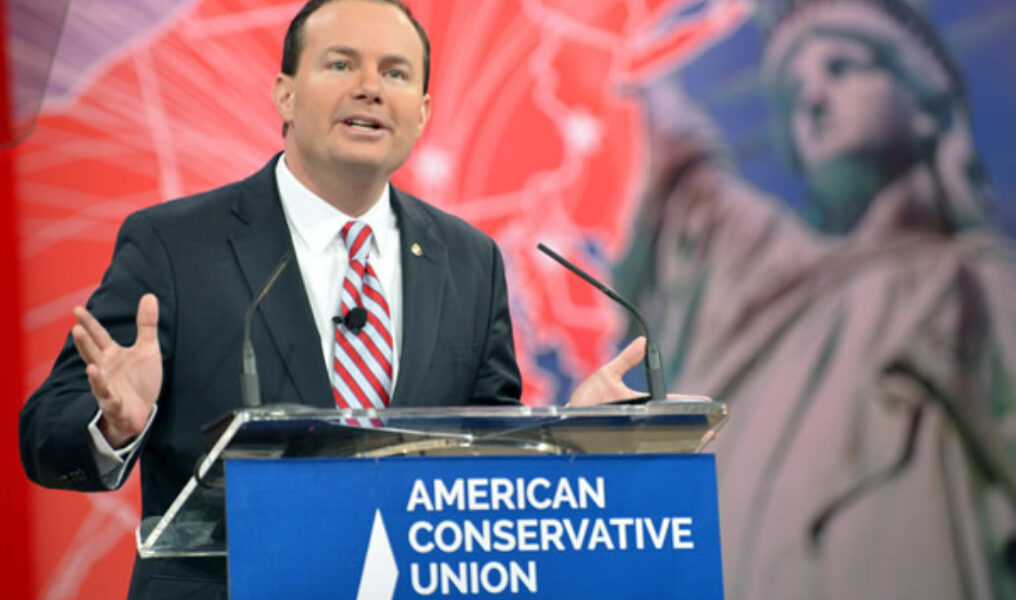Anti-LGBT 'Religious Freedom' Bill is Back — and Trump has Promised to Sign
Sen. Mike Lee (R-Utah) has reintroduced legislation in the U.S. Senate seen to enable anti-LGBT discrimination in the name of "religious freedom" — and President Trump made signing the legislation a campaign promise during the 2016 election.
The purported intent of the First Amendment Defense Act, as introduced by Lee on Thursday, is to protect individuals from adverse action by the U.S. government if they oppose same-sex marriage or sexual relations outside of marriage.
Lee said in a statement the legislation is necessary to ensure the federal government doesn't impinge on individuals' beliefs about marriage.
"What an individual or organization believes about the traditional definition of marriage is not – and should never be – a part of the government's decision-making process when distributing licenses, accreditations, or grants," Lee said. "And the First Amendment Defense Act simply ensures that this will always be true in America – that federal bureaucrats will never have the authority to require those who believe in the traditional definition of marriage to choose between their living in accordance with those beliefs and maintaining their occupation or their tax status."
A section of the bill explicitly forbids the U.S. government from "alter[ing] in any way the federal tax treatment" of institutions that oppose same-sex marriage. That has been a concern expressed by public universities against gay nuptials, such as Brigham Young University, who fear their tax-exempt status will be stripped away much like the U.S. Supreme Court in 1983 stripped Bob Jones University of its tax-exempt status for not recognizing interracial marriage. (Bob Jones dropped its interracial ban in 2000 and its tax-exempt status has been restored.)
According to Lee's office, the legislation has 21 co-sponsors who are all Republicans. Among them are Sens. Marco Rubio (R-Fla.), Orrin Hatch (R-Utah), Ben Sasse (R-Neb.), Rand Paul (R-Ky.), Tim Scott (R-S.C.), Tom Cotton (R-Ark.) and Ted Cruz (R-Texas).
But critics say the legislation, also known as FADA, would impair LGBT rights in various ways because it would carve into federal non-discrimination protections for LGBT people.
For example, FADA would undermine President Obama's executive order against anti-LGBT workplace discrimination among federal contractors. Although legislation says it wouldn't apply to federal for-profit contractors, that means non-profit contractors — such as religious affiliated hospital or university — would be able to engage in anti-LGBT discrimination and still obtain U.S. government contracts.
Jennifer Pizer, law and policy Director for Lambda Legal, said the bill is evidence "one of the main goals is to freeze-frame the lack of civil rights protections for LGBT people."
"Many religiously affiliated non-profits want to keep getting lots of public money and want to be able to discriminate," Pizer said. "We have been steadily building the body of the law and the public recognition and that that discrimination is wrong and that's true if it's LGBT people or same-sex couples as well, so it's an effort to get public money."
David Stacy, government affairs director for the Human Rights Campaign, said in a statement the legislation "would legalize state-sanctioned discrimination and undermine key civil rights protections for LGBTQ people."
"Supporters of this legislation are using religious liberty as a sword to hurt LGBTQ families rather than staying true to our long tradition of it serving as a shield to protect religious expression from government overreach," Stacy said.
According to Human Rights Campaign, FADA would compromise Obama's 2014 executive order, LGBT non-discrimination protections in the Violence Against Women Act for emergency shelters; LGBT non-discrimination rules for homeless shelters within the Department of Housing & Urban Development; and same-sex couples access to benefits under the Family & Medical Leave Act.
Conn Carroll, a Lee spokesperson, downplayed via an email to the Washington Blade the possibility the legislation would affect each of these pro-LGBT measures.
On Obama's 2014 executive order, Carroll said FADA would "prevent a government agency from cancelling a contract just because some bureaucrat didn't like a religious contractor," but offer no organizations protection "from an EEOC claim that they discriminated against gay people." (That response address concerns about compromising the executive order by asserting the U.S. Equal Employment Opportunity Commission could take up the slack.)
Carroll denied FADA would supersede Family & Medical Leave Act benefits and, with regard to HUD rules, said he's "unaware of any homeless shelter even asking about a beneficiary's married status."
With respect to compromised LGBT protections at emergency shelters under VAWA, Carroll also said he doesn't see a problem.
"I could see an organization declining to counsel in support of a same-sex marriage, but why would anyone decline to protect someone in an abusive relationship?" Carroll said.
Pizer the kind of discrimination Carroll said doesn't exist is much more widespread than one might think even with LGBT non-discrimination protections in place.
"You have many vulnerable members of our communities who should get better treatment, whether it's youth in foster care, or whether it's people in medical settings, or whether it's people who are homeless," Pizer said. "That's an enormous area of concern and lots of that bad treatment happens now."
The website for Lee's Senate office has a Q&A about FADA that seeks to downplay the potential impact of the legislation on LGBT rights.
The Q&A denies FADA would make it legal for businesses to refuse service to gay people; for churches to fire gay employees; for businesses to deny benefits for same-sex partners; for landlords to advertise that they will not rent to unmarried parents; or for federal bureaucrats to refuse to process benefit claims made by same-sex couples.
On the question on whether FADA targets gay people, the Q&A says the answer is "absolutely not."
"Many religious institutions have codes of conduct that forbid premarital sexual relations among their members even when those sexual relations are completely heterosexual," the Q&A says. "FADA would protect those heterosexual codes of conduct just as it would protect traditional beliefs about marriage."
Pizer said the answer is "no" when asked if the Q&A's denials about FADA are accurate based on "how the different concepts are framed" in the discussion.
"So the whole description of the landscape, I think, is a mistake and it is consistent with their way of framing all of these religious exemptions," Pizer said.
Trump made a pledge to sign the FADA a campaign promise during the 2016 election — one he spelled out in a statement to social conservative Catholics who support his candidacy.
"If I am elected president and Congress passes the First Amendment Defense Act, I will sign it to protect the deeply held religious beliefs of Catholics and the beliefs of Americans of all faiths," Trump said.
The White House didn't immediately respond to the Washington Blade's request to comment on whether Trump still supports the First Amendment Defense Act and would sign the legislation as introduced into law.
FADA has undergone various iterations in the past. Although the latest version is some respects more narrow than it was first introduced, FADA has new language covering individuals who think marriage should limited to "two individuals as recognized under federal law," not just confined to opposite-sex couples.
Pizer said that new language may be an attempt to make FADA seem less discriminatory, but in fact "that doesn't cure the problem" because the bill make clear it's main concern is a desire not to recognize same-sex marriage.
"It's kind of like saying, 'OK, we're going to specially privilege people who want to discriminate based on religion against Jews, oh, and also people who want to discriminate against Italians, so therefore we've taken care, it's not really just about discriminating against Jews,'" Pizer said. "It's like well sure it is; you didn't take care of the problem."
Should Congress pass the legislation and Trump sign it into law, Pizer said it would be "subject to challenge" in the courts and found constitutional because it violates the Establishment Clause and Equal Protection Clause.
"It's an Establishment Clause problem because it's preferring a particular religious view and set of views over other religious positions, and it's an Equal Protection problem because it's targeting same-sex couples," Pizer said. "The focus on religious objections to same-sex couples is right there and explicit, and, as I said, you can't cure that problem by adding some other language that seems to permit discrimination against other people, I'm not sure who it would relate to. They haven't cured the problem by adding additional permission to discriminate."
This article originally appeared in the Washington Blade and is made available in partnership with the National LGBT Media Association.











